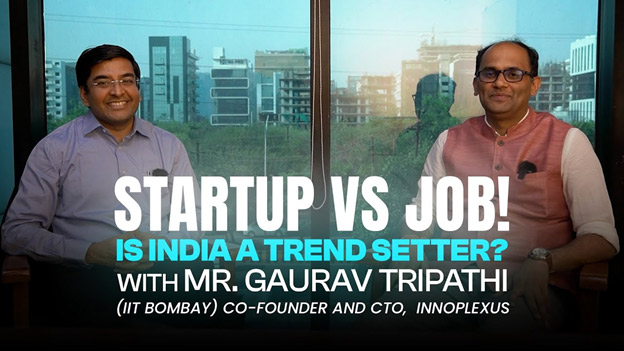The podcast episode titled “Mr. Gaurav Tripathi, IIT Bombay, Co-founder and CTO, Innoplexus on Startup Vs Job, Entrepreneurship” was hosted by Forum For Global Studies, a Delhi based multidisciplinary thinktank. Dr Sandeep Tripathi moderated the session and the talk featured Mr Gaurav Tripathi, an IIT Bombay Alumnus. The discussion focused on the dynamic landscape of tech innovations and startup ventures.
Dr Tripathi opened the discussion by introducing Mr Gaurav Tripathi, cofounder and CTO at Innoplexus. Dr. Tripathi began his remarks by discussing the burgeoning start-up culture in India, citing initiatives such as Invest India, Startup in India, and Make In India. Mr Gaurav walked us through his journey of building a successful business, with his first company during his final year in the era of Web 2.0. Later he talked about his venture of building “Innoplexus” along with his batchmate Dr Gunjan Bharadwaj. Furthermore, he provided a brief overview of Innoplexus and its operations, including its ranking in the industry. He stressed the significance of data in today’s market. Furthermore, he mentioned his current endeavor “Partex”.
Dr. Tripathi later posed the question of whether the university’s brand is crucial or if it’s the business idea that holds more significance. Mr Gaurav cited his thoughts by stating that it’s the conviction and vision of the entrepreneur that more than any university label. He further asserted the leverage IITs, IIMs and other prestigious institutes provide for business building over other educational institutions. Later, Dr. Tripathi shared his perspective on the debate between University Brand and Business Idea narratives, emphasizing the significance of the latter. Further Dr Tripathi talked about India being a trendsetter in startups with its new initiatives fostering innovation. Mr. Gaurav backs his point by mentioning India’s growing startup ecosystem and how Indian companies are making a mark globally, especially in Fintech. Both the scholars discussed the role India played in the global market, given the size of its population and representation. Dr. Tripathi then expressed his concern about the feasibility of startups for Indian youth compared to opting for traditional jobs.
Mr Gaurav addressed the concern by stating the importance of startups for generating employment and emphasized on synergy of vacancies and market forces, citing the example of MSMEs and high paying jobs. He emphasized factors such as migration and the concentration of jobs in specific regions, which can lead to an unsustainable lifestyle in those areas. Both the experts later discussed India’s role as ‘Vishwaguru’ and how the startup culture is cardinal for India’s growth and its role as a leader. Mr Gaurav highlights the success of ‘Make In India’ in the areas of exports ranging from mobiles to defense. Dr Tripathi and Mr Gaurav discussed the challenges in building a business and how the startup has the potential to influence lives for betterment. Talking about India’s position in 2047, Dr Tripathi questioned India’s potential to be ‘Vishwaguru’ in economic terms. Mr Gaurav expressed his thoughts by stating Kautilya’s verse ‘Dharmasya Moolam Artham’, economy being the foundation of wellbeing. The discussion delved into the transition in India’s role from ‘Vishwashakti’ to ‘Vishwaguru’ and how a robust economy is in evident for India to become a global leader.
At the end of the podcast Dr Tripathi highlighted India’s effort to include the African Union in G20 grouping. Having quoted Russian Prime Minister Putin’s remarks on the importance of AI in emerging markets, Dr Tripathi questioned Mr Gaurav the significance of AI for business leaders. Mr. Gaurav highlighted the role of AI as a leveling tool for startups, enabling them to challenge giant businesses and enhancing their efficiency to achieve success. He emphasized this importance by referencing an incident where Nvidia CEO Jensen Huang noted that India shouldn’t export data and import AI. He supported his argument by stating India’s investment in manufacturing GPU clusters and AI technology for enabling a tech ecosystem. Mr Gaurav concluded his views by stating India’s potential in AI technology, citing the role of emerging businesses like ‘Yota’.

